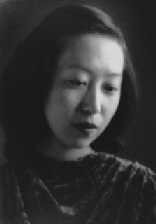 Chang met her first husband Hu Lancheng in 1943 and married in the following year. She loved him dearly, despite the fact that he was already married as well as having been labeled a traitor to the Japanese. When Japan was defeated in 1945, Hu escaped to Wenzhou, where he fell in love with yet another woman. When Chang traced him to his refuge, she realized she could not salvage their marriage. They finally divorced in 1947.
Chang met her first husband Hu Lancheng in 1943 and married in the following year. She loved him dearly, despite the fact that he was already married as well as having been labeled a traitor to the Japanese. When Japan was defeated in 1945, Hu escaped to Wenzhou, where he fell in love with yet another woman. When Chang traced him to his refuge, she realized she could not salvage their marriage. They finally divorced in 1947.
In 1952, Chang migrated to Hong Kong, where she worked as a translator for the American News Agency for three years. She then left for the United States in the fall of 1955, never to return to the mainland again.
In New York, Chang met her second husband, the American scriptwriter Ferdinand Reyer, whom she married in August 1956. Reyer was paralyzed after he suffered from strokes in 1961, while Chang was on a trip toTaiwan, and he eventually died in 1967. After Lai's death, Chang held short-term jobs at Radcliffe College and UC Berkeley.
Chang relocated to Los Angeles in 1973. Two years later, she completed an English translation ofThe Biography of Hai Shang Hua(Hai Shang Hua Lie Zhuan), a celebrated Qing novel written in the Wu dialect.
Chang was discovered dead in her apartment on Sept. 8, 1995. According to a will, she was to be cremated without a funeral. Her ashes were scattered in the Pacific Ocean.
 Chang's main works:
Chang's main works:
Tao Hua Yun(The Wayward Husband)
Liu Yue Xin Niang (The June Bride)
Xiao Er Nu (Father takes a Bride)
Yi Qu Nan Wang
Qing Cheng Zhi Lian(Love in a Fallen City)
Yuan Nu
Hong Meigui Yu Bai Meigui(The Red Rose and the White Rose)
Ban Sheng Yuan(Yuan of Half a Life, also known asEighteen Springs)
Jin Suo Ji(Record of a Golden Lock)
Author: Jeff
